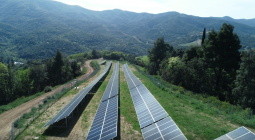Persistent lignite dependency: The Greek energy sector under pressure.
ABSTRACT
After the World War II, Greece began to base its electricity production on local lignite. An historical analysis of the evolution of the Greek energy sector, through semi structured interviews and analysis of the archives, reveals that specific characteristics of the Greek political system and the emergence of the European climate and energy policy, have transformed the use of lignite, from a solution to the electrification of the country, to an environmental, health, political and economic problem. Resistance to change and the consequent difficulty to adapt to the changing European context has led the main player in the energy sector, the Public Power Corporation (PPC)1 , and therefore the sector itself, into a period of major crisis. As the use of lignite has become unprofitable and damaging for the national economy, the newly elected government recently announced the closure of all lignite units by 2028. Both the liberalization of the energy market and energy transition are the expected results of this decision, although it is not yet known to what extent this evolution will be climate-friendly.
Read the original article here:
22 September 2020
ELSEVIER




